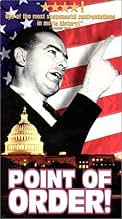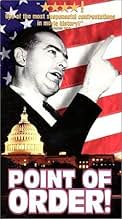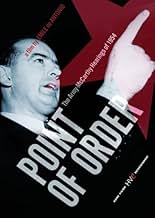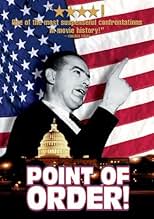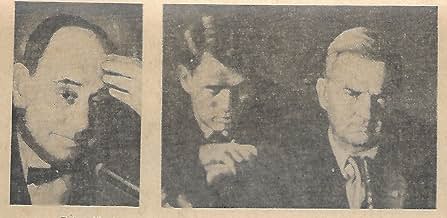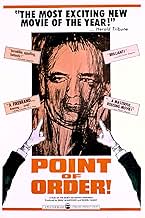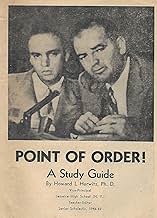An unfiltered, unflinching document of the notorious 1954 Army-McCarthy hearings, compiled entirely from raw TV footage (with no narration, music, or added scenes).An unfiltered, unflinching document of the notorious 1954 Army-McCarthy hearings, compiled entirely from raw TV footage (with no narration, music, or added scenes).An unfiltered, unflinching document of the notorious 1954 Army-McCarthy hearings, compiled entirely from raw TV footage (with no narration, music, or added scenes).
- Awards
- 1 win total
John G. Adams
- Self - U.S. Army counsel
- (archive footage)
Roy M. Cohn
- Self
- (archive footage)
Ray Jenkins
- Self
- (archive footage)
- (as Ray H. Jenkins)
Joseph McCarthy
- Self
- (archive footage)
John L. McClellan
- Self - U.S. Senator, Arkansas
- (archive footage)
Karl E. Mundt
- Self - U.S. Senator, South Dakota
- (archive footage)
G. David Schine
- Self - U.S. Army private
- (archive footage)
Robert T. Stevens
- Self - U.S. Secretary of the Army
- (archive footage)
Stuart Symington
- Self - U.S. Senator, Missouri
- (archive footage)
Joseph N. Welch
- Self
- (archive footage)
Featured reviews
The best thing about this documentary is that there is no narration, there is no commentary; clips of the Army-McCarthy hearings that finally brought an end to Joseph McCarthy and his era of bully politics that destroyed so many American lives. There are arguments both pro and con re: McCarthy and his basic premise (that Communists had infiltrated Hollywood and the American government, indeed, all the way to the Executive Branch). He may have had a valid point at one time or another, but it quickly became overshadowed by his ego and insatiable appetite for power.
Sound like anyone we've seen recently in Washington? I recommend viewing this riveting film as it is not partisan - it is McCarthy in all his egomaniacal ranting and raving against those who stood by their personal beliefs and held firm in their convictions that the Constitution of the United States of America would forever be their guide.
Sound like anyone we've seen recently in Washington? I recommend viewing this riveting film as it is not partisan - it is McCarthy in all his egomaniacal ranting and raving against those who stood by their personal beliefs and held firm in their convictions that the Constitution of the United States of America would forever be their guide.
Apparently the DVD's as of 2012 are expensive to obtain. My used one ran 50 bucks. Anyway, this is a slice of history that riveted the nation in those early days of coast-to-coast TV. Reviewer Mike Rice does a good job of filling in the background, so there's no need to repeat it here.
The documentary is an edited version of the 1954 senate hearings. On the whole, editing is to film footage what the eraser is to penciled composition. In short, astute editing can be used to create many, sometimes incompatible, effects. Now, I have no reason to believe editing was used here to skew any particular effect, but its potential for mischief is well to keep in mind.
Maybe it's my seven decades of breathing, but I did have some trouble following the narrative, and could have used some helpful bridges (a voice-over or graphics) to flesh out better continuity, especially when the topic of the Hearings changes. But whatever the difficulty, the legal fencing between experts is fascinating to watch. Note, for example, how no one on either side responds with a simple yes or no.
Naturally, most viewers approach the material with their own political pre-conceptions. I have mine, still I want to venture several observations not rooted, I believe, in my politics. Firstly, I don't recall seeing clips of McCarthy smiling before; here he at times appears almost affable, contrary to his usual sour image. Secondly, Welch is one eloquent attorney who really knows how to think on his feet. The usual brief clips of "Have you no sense of decency" only hint at those abilities. Then too, he's so unprepossessing looking you don't expect him to dominate the way he sometimes does. Lastly, I'd really like to know who concocted that phony letter from Hoover, along with the cropped photo. I may have missed something, but I don't believe those questions are resolved in the footage.
Be that as it may, Point of Order is real life dramatics at its most fascinating and remains an important slice of post-war history, from which the junior senator from Wisconsin never really recovered.
The documentary is an edited version of the 1954 senate hearings. On the whole, editing is to film footage what the eraser is to penciled composition. In short, astute editing can be used to create many, sometimes incompatible, effects. Now, I have no reason to believe editing was used here to skew any particular effect, but its potential for mischief is well to keep in mind.
Maybe it's my seven decades of breathing, but I did have some trouble following the narrative, and could have used some helpful bridges (a voice-over or graphics) to flesh out better continuity, especially when the topic of the Hearings changes. But whatever the difficulty, the legal fencing between experts is fascinating to watch. Note, for example, how no one on either side responds with a simple yes or no.
Naturally, most viewers approach the material with their own political pre-conceptions. I have mine, still I want to venture several observations not rooted, I believe, in my politics. Firstly, I don't recall seeing clips of McCarthy smiling before; here he at times appears almost affable, contrary to his usual sour image. Secondly, Welch is one eloquent attorney who really knows how to think on his feet. The usual brief clips of "Have you no sense of decency" only hint at those abilities. Then too, he's so unprepossessing looking you don't expect him to dominate the way he sometimes does. Lastly, I'd really like to know who concocted that phony letter from Hoover, along with the cropped photo. I may have missed something, but I don't believe those questions are resolved in the footage.
Be that as it may, Point of Order is real life dramatics at its most fascinating and remains an important slice of post-war history, from which the junior senator from Wisconsin never really recovered.
Without narration, this documentary presents audio-visual excerpts from the famous Army-McCarthy hearings of 1954. The televised hearings were significant in that they brought to light the mean-spirited, and unfounded, accusations of an American demagogue, Wisconsin Senator Joseph McCarthy, a man who claimed that certain individuals, both in the U.S. Army and elsewhere in American government, were Communist spies.
What is glaringly obvious, from this documentary, is that McCarthy had no evidence. He and his chief counsel, Roy Cohn, accused, implicated, vilified, and pointed fingers. And the political climate in the 1950s was such that even these accusations were enough to destroy the careers and lives of many individuals. McCarthy, an ambitious politician, used fear as a weapon, which contributed to unwarranted suspicion during the Cold War.
The hearings are theatrical, Shakespearean drama, in part. Several times, impassioned speeches are made. At other times, the proceedings are laughably petty, like when the committee examines a photograph of Army Private David Schine (pronounced Shine). The subtext during this segment is that David Schine and Roy Cohn had some sort of homosexual relationship, an ironic development, given that Cohn and McCarthy, as political Conservatives, would be just as hostile to homosexuals as to Communists.
One might think that "Point Of Order" would be dry and boring. But the political atmosphere was so charged, so on-edge, that the viewer can easily discern the tension, the fear, and the anxiety of people who had no idea how these events would play out.
McCarthy probably thought these hearings would be a stepping stone en route to the White House. Instead, the camera, as hero, revealed to the American people that McCarthy was a fear monger. Television was his downfall. And the overall message of "Point Of Order" is that enhanced communications technology, in this case television, can be used to thwart the plans of would-be dictators and tyrants.
Today, money has corrupted television. But communications technology continues to evolve, and the internet now functions as a medium that shines lights into dark corners, as television did fifty years ago.
What is glaringly obvious, from this documentary, is that McCarthy had no evidence. He and his chief counsel, Roy Cohn, accused, implicated, vilified, and pointed fingers. And the political climate in the 1950s was such that even these accusations were enough to destroy the careers and lives of many individuals. McCarthy, an ambitious politician, used fear as a weapon, which contributed to unwarranted suspicion during the Cold War.
The hearings are theatrical, Shakespearean drama, in part. Several times, impassioned speeches are made. At other times, the proceedings are laughably petty, like when the committee examines a photograph of Army Private David Schine (pronounced Shine). The subtext during this segment is that David Schine and Roy Cohn had some sort of homosexual relationship, an ironic development, given that Cohn and McCarthy, as political Conservatives, would be just as hostile to homosexuals as to Communists.
One might think that "Point Of Order" would be dry and boring. But the political atmosphere was so charged, so on-edge, that the viewer can easily discern the tension, the fear, and the anxiety of people who had no idea how these events would play out.
McCarthy probably thought these hearings would be a stepping stone en route to the White House. Instead, the camera, as hero, revealed to the American people that McCarthy was a fear monger. Television was his downfall. And the overall message of "Point Of Order" is that enhanced communications technology, in this case television, can be used to thwart the plans of would-be dictators and tyrants.
Today, money has corrupted television. But communications technology continues to evolve, and the internet now functions as a medium that shines lights into dark corners, as television did fifty years ago.
This is a phenomenal work! It cuts thru the chaff of the hearings and gives the "good stuff", almost like a Cliff's notes. It could stand an updating, the graphics are typical for the time period, and at times it is difficult to see how is talking, but it is truly awesome, it will suck you in immediately. It is amazing to see these guys go back and forth. Look for a young RFK in the background...
"Point of Order" is an example of a modern-day Eisenstein. It took material from the recesses of American history, recombined and made a film with complete sense, albeit weighted against McCarthy. It is an excellent piece of work but then it shows quite well how evidence reassembled can make someone seem guilty. That is the virtuosity of the filmmaker.
Unlike one of the reviewers, I think that McCarthy was a monster, a publicity-seeking man out of control who thought absolutely nothing about the lives he ruined or attempted to ruin, however, falsely but I'm begging the issue here. The film is marvelously well put together and de Antonio possesses remarkable technique to make things seem "alive". Again it's easy to see things in black and white ideologically but the film within itself is impeccable.
Unlike one of the reviewers, I think that McCarthy was a monster, a publicity-seeking man out of control who thought absolutely nothing about the lives he ruined or attempted to ruin, however, falsely but I'm begging the issue here. The film is marvelously well put together and de Antonio possesses remarkable technique to make things seem "alive". Again it's easy to see things in black and white ideologically but the film within itself is impeccable.
Did you know
- TriviaIncluded in The New Republic's list of "The 100 Most Important Political Films of All Time."
- ConnectionsFeatured in McCarthy: Death of a Witch Hunter (1975)
Details
- Release date
- Country of origin
- Language
- Also known as
- Herr ordförande! En ordningsfråga
- Production company
- See more company credits at IMDbPro
- Runtime
- 1h 37m(97 min)
- Color
- Sound mix
- Aspect ratio
- 1.37 : 1
Contribute to this page
Suggest an edit or add missing content

